
🚀 Work With Us
Private Coaching
Language Editing
Qualitative Coding
✨ Free Resources
Templates & Tools
Short Courses
Articles & Videos

Critical Writing 101
By: Derek Jansen (MBA) | Expert Reviewed By: Dr Eunice Rautenbach | April 2017

A cross the thousands of students we work with , descriptive writing (as opposed to critical or analytical writing) is an incredibly pervasive problem . In fact, it’s probably the biggest killer of marks in dissertations, theses and research papers . So, in this post, we’ll explain the difference between descriptive and analytical writing in straightforward terms, along with plenty of practical examples.
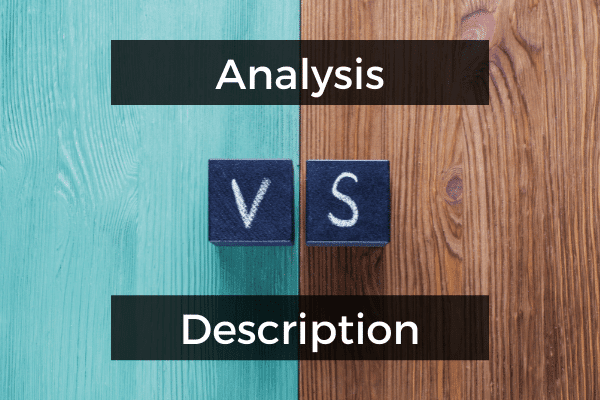
Descriptive vs Analytical Writing
Writing critically is one of the most important skills you’ll need to master for your academic journey, but what exactly does this mean?
Well, when it comes to writing, at least for academic purposes, there are two main types – descriptive writing and critical writing. Critical writing is also sometimes referred to as analytical writing, so we’ll use these two terms interchangeably.
To understand what constitutes critical (or analytical) writing, it’s useful to compare it against its opposite, descriptive writing. At the most basic level, descriptive writing merely communicates the “ what ”, “ where ”, “ when ” or “ who ”. In other words, it describes a thing, place, time or person. It doesn’t consider anything beyond that or explore the situation’s impact, importance or meaning. Here’s an example of a descriptive sentence:
“Yesterday, the president unexpectedly fired the minister of finance.”
As you can see, this sentence just states what happened, when it happened and who was involved. Classic descriptive writing.
Contrasted to this, critical writing takes things a step further and unveils the “ so what? ” – in other words, it explains the impact or consequence of a given situation. Let’s stick with the same event and look at an example of analytical writing:
“The president’s unexpected firing of the well-respected finance minister had an immediate negative impact on investor confidence. This led to a sharp decrease in the value of the local currency, especially against the US dollar. This devaluation means that all dollar-based imports are now expected to rise in cost, thereby raising the cost of living for citizens, and reducing disposable income.”
As you can see in this example, the descriptive version only tells us what happened (the president fired the finance minister), whereas the critical version goes on to discuss some of the impacts of the president’s actions.

Ideally, critical writing should always link back to the broader objectives of the paper or project, explaining what each thing or event means in relation to those objectives. In a dissertation or thesis, this would involve linking the discussion back to the research aims, objectives and research questions – in other words, the golden thread .
Sounds a bit fluffy and conceptual? Let’s look at an example:
If your research aims involved understanding how the local environment impacts demand for specialty imported vegetables, you would need to explain how the devaluation of the local currency means that the imported vegetables would become more expensive relative to locally farmed options. This in turn would likely have a negative impact on sales, as consumers would turn to cheaper local alternatives.
As you can see, critical (or analytical) writing goes beyond just describing (that’s what descriptive writing covers) and instead focuses on the meaning of things, events or situations, especially in relation to the core research aims and questions.
Need a helping hand?
But wait, there’s more.
This “ what vs so what” distinction is important in understanding the difference between description and analysis, but it is not the only difference – the differences go deeper than this. The table below explains some other key differences between descriptive and analytical writing.
Should I avoid descriptive writing altogether?
Not quite. For the most part, you’ll need some descriptive writing to lay the foundation for the critical, analytical writing. In other words, you’ll usually need to state the “what” before you can discuss the “so what”. Therefore, description is simply unavoidable and in fact quite essential , but you do want to keep it to a minimum and focus your word count on the analytical side of things.
As you write, a good rule of thumb is to identify every what (in other words, every descriptive point you make) and then check whether it is accompanied by a so what (in other words, a critical conclusion regarding its meaning or impact).
Of course, this won’t always be necessary as some conclusions are fairly obvious and go without saying. But, this basic practice should help you minimise description, maximise analysis, and most importantly, earn you marks!
Let’s recap.
So, the key takeaways for this post are as follows:
- Descriptive writing focuses on the what , while critical/analytical writing focuses on the so what .
- Analytical writing should link the discussion back to the research aims, objectives or research questions (the golden thread).
- Some amount of description will always be needed, but aim to minimise description and maximise analysis to earn higher marks.

You Might Also Like:

How To Choose A Tutor For Your Dissertation
Hiring the right tutor for your dissertation or thesis can make the difference between passing and failing. Here’s what you need to consider.

5 Signs You Need A Dissertation Helper
Discover the 5 signs that suggest you need a dissertation helper to get unstuck, finish your degree and get your life back.

Writing A Dissertation While Working: A How-To Guide
Struggling to balance your dissertation with a full-time job and family? Learn practical strategies to achieve success.

How To Review & Understand Academic Literature Quickly
Learn how to fast-track your literature review by reading with intention and clarity. Dr E and Amy Murdock explain how.

Dissertation Writing Services: Far Worse Than You Think
Thinking about using a dissertation or thesis writing service? You might want to reconsider that move. Here’s what you need to know.
📄 FREE TEMPLATES
Research Topic Ideation
Proposal Writing
Literature Review
Methodology & Analysis
Academic Writing
Referencing & Citing
Apps, Tools & Tricks
The Grad Coach Podcast
22 Comments
Thank you so much. This was helpful and a switch from the bad writing habits to the good habits.
Great to hear that, Sarah. Glad you found it useful!
I am currently working on my Masters Thesis and found this extremely informative and helpful. Thank you kindly.
I’m currently a University student and this is so helpful. Thank you.
It really helped me to get the exact meaning of analytical writing. Differences between the two explains it well
Thank you! this was very useful
With much appreciation, I say thank you. Your explanations are down to earth. It has been helpful.
Very helpful towards my theses journey! Many thanks 👍
very helpful
very helpful indeed
Thanks Derek for the useful coaching
Thank you for sharing this. I was stuck on descriptive now I can do my corrections. Thank you.
I was struggling to differentiate between descriptive and analytical writing. I googled and found this as it is so helpful. Thank you for sharing.
I am glad to see this differences of descriptive against analytical writing. This is going to improve my masters dissertation
Thanks in deed. It was helpful
Thank you so much. I’m now better informed
Busy with MBA in South Africa, this is very helpful as most of the writing requires one to expound on the topics. thanks for this, it’s a salvation from watching the blinking cursor for hours while figuring out what to write to hit the 5000 word target 😂
It’s been fantastic and enriching. Thanks a lot, GRAD COACH.
Wonderful explanation of descriptive vs analytic writing with examples. This is going to be greatly helpful for me as I am writing my thesis at the moment. Thank you Grad Coach. I follow your YouTube videos and subscribed and liked every time I watch one.
Very useful piece. thanks
Brilliantly explained – thank you.
Submit a Comment Cancel reply
Your email address will not be published. Required fields are marked *
Save my name, email, and website in this browser for the next time I comment.
Submit Comment
- Print Friendly
Analytical essay vs. Descriptive essay
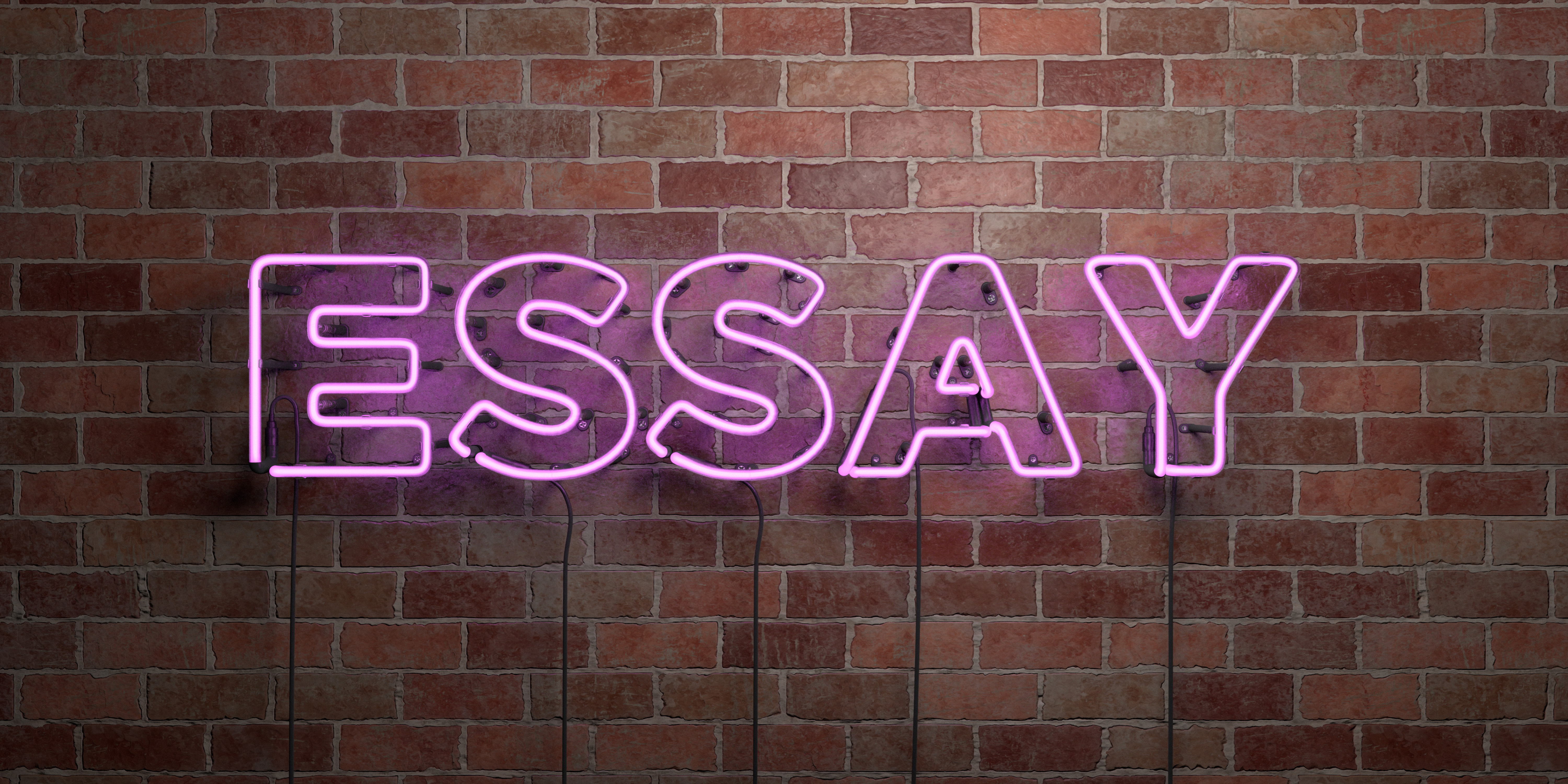
When experts apply for educational courses, scholarships, grants, or careers, they have to write an essay or prepare an application letter to go with their application resources. Analytical and descriptive essays are two sorts of essays that an admissions committee or prospective employer may seek. If you’re applying for an educational course, a research award, a scholarship, or a job, you might want to discover these writing patterns.
What is an analytical essay
An analytical essay is a writing assignment that demonstrates the effect or outcome of a particular activity or event. Analytical essays look at specific aspects of a procedure, event, or subject. Analytical essay writers must also consider how these components converse with one another. Since descriptive elements are common in analytical essays, they also provide a fresh outlook or reasoning for readers to take into account.
They provide more precise details, data, and proof to back up abstract thoughts and perspectives than descriptive essays do. Analytical essays could also assess a topic’s positive aspects and shortcomings, make educated decisions about it and draw inferences relying on research. Keywords used in analytical essays involve distinction, comparison, and examination. The core attributes of analytical writing are assessment and comparison, and it goes further than simply stating an event, a person, or a thing. This writing style answers why what, and what. One must know to convey their content in an argumentative context. It demands the ability to purpose and give evidence to the viewer. There are numerous techniques to express reasoning, but the subject must be well-organized, practical, and contribute to a final result. The primary goal of an analytical essay is not to give information or figures to the audience, but to analyze the statistics and compare and verify them to conclude. Analytical writing could be employed in academic works to measure and interpret precise details. As a result, that’d be beneficial for correlating statistical data or theories.
How to write an analytical essay
What is a descriptive essay
A descriptive essay is a writing task that concentrates solely on what something is or what occurred. Rather than introducing reasoning, descriptive essays introduce the audience with simple factual information. The writer’s objective is usually to describe what happened, showcase key points, or analyze their insight on a particular topic. Descriptive essays could concentrate on an individual, place, or thing, recount an event, or give a short outline of a theory. The words how, specify, and summarize are used by authors in descriptive essays. When writing a descriptive essay, concentrate on adding your primary idea as transparent, reliable, and specific. Introduce supporting factual data and relevant facts in a cohesive manner. Descriptive writing is widely perceived as the most basic kind of educational writing because it merely seeks to provide the audience with statistics and details. This writing style effectively answers the questions of what, when, where, and who. The ideal instances of descriptive essays are an article overview or the findings of a scientific study. A few of the terms utilized by educators to imply that they prefer descriptive writing are summarize, gather, describe, outline, document, recognize, and so on. When discussing a person, place, or thing, descriptive writing is regularly used by the author to convey the entire perception to the audience. It prompts the use of rich language and strongly packed text full of analogies to present the viewer with a striking picture as if they were witnessing the scenario of writing. Although a few parts are solely descriptive, this writing technique is employed as an opening to other forms of writing. A descriptive essay can focus on the following essay description topics;
- A descriptive essay can be about a location, divided into a geographical area, weather, politics, religion, and customs.
- Discovering an event in history in proper sequence, starting with a paragraph about what induced it, then moving on to an explanation of the incident itself, and finally ending with its implications.
- A news item that includes a synopsis of the event, perspective about the persons affected, details about the location where it happened, and understanding of related events.
Difference between Analytical vs. Descriptive essay
Since analytical and descriptive essays are widely known alternatives in educational and professional setups, there are some key distinctions between these two forms of writing. Here are a few of the most significant differences between analytical and descriptive essays;
- A descriptive essay provides a summary of an event, person, place, or object, while an analytical essay concentrates on the repercussions of an event.
- A descriptive essay states the factual data, while an analytical essay can broaden an appropriate issue or theory by incorporating the latest questions and discussions.
- An analytical essay concentrates on reasoning, facts, and framework, so a descriptive essay is about comparisons, metaphors, and rich perceptual language.
- A descriptive essay gives non-biased details, while an analytical essay identifies if a response has a positive or negative impact.
- An analytical essay’s primary objective is to assess, examine, and identify something, while a descriptive essay’s overall purpose is to reveal information and details.
- A descriptive essay enables the audience to establish their own opinions, while an analytical essay builds an outcome.
- Analytical essays emphasize why and what, and descriptive essays focus on what, when, and where.
As the name implies, an analytical essay means examining a subject. Maintain your analytical essay concentrated on the key topic and avoid turning it into a synopsis. Prepare your essay before you begin, including what you should say initially, last, and so on. Establish a powerful introduction that contains a well-developed dissertation that will serve as the foundation of your essay. Utilize the body paragraphs to back up your essay with solid reasoning and all related details. Finish the analytical essay with a quick description of the entire essay, and you may add your own opinions on the issue.
The descriptive essay is in which the student has to identify something—a thing, person, location, experience, perception, scenario, and so on. This genre motivates students to write a written record of a specific experience. Besides, this genre facilitates artistic freedom, with the intent of developing a colorful and progressing impression in the minds of the viewer.
How to write a descriptive essay
Paraphrasing tool

Analytical Essay
Analytical essay generator.
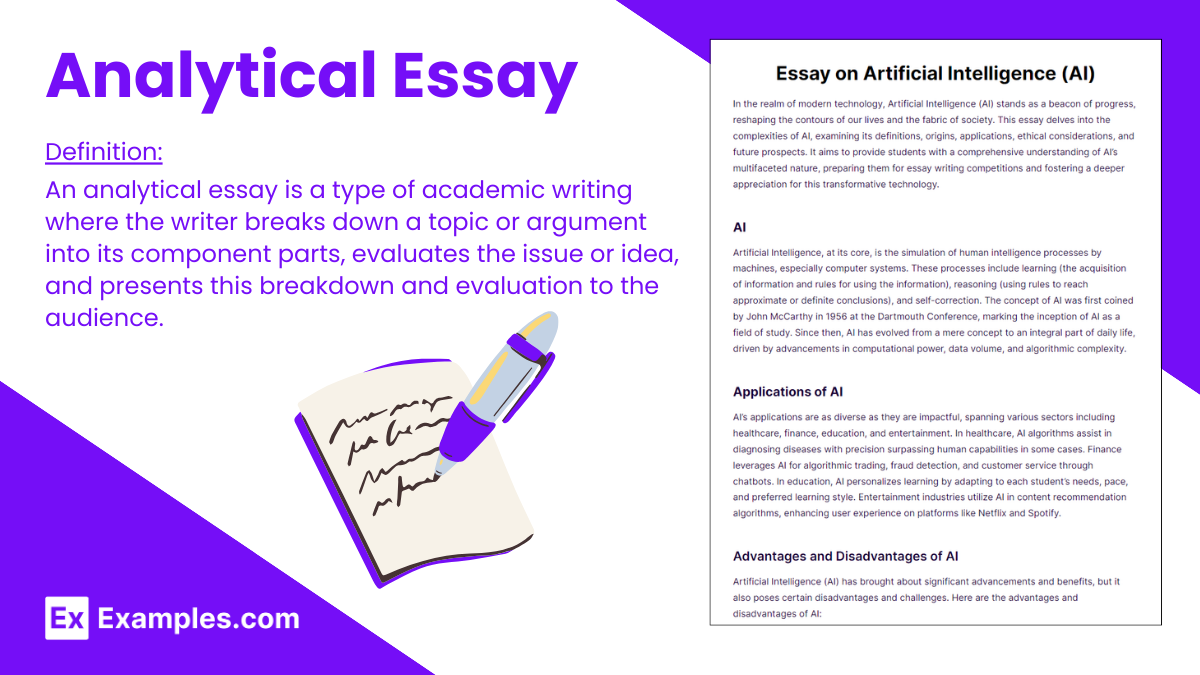
There are different types of essays which I would assume most of you are already familiar with. Persuasive essays , reflective essays , and descriptive essays are just among the few examples. Essays are rather seen important especially in the life of a student, because it is often what your grades are based on.
Knowing how to start an essay is an important in key in writing effective essay . In addition to that, your point of view will determine the kind of essay you are writing. This article will be able to help you in understanding another kind of essay, which is the analytical essay.
What is an Analytical Essay?- Definition
An analytical essay is a type of academic writing where the writer breaks down a topic or argument into its component parts, evaluates the issue or idea, and presents this breakdown and evaluation to the audience. It aims to convey a deeper understanding and insight into the subject being analyzed. Analytical essays require critical thinking and a clear argumentative structure, often addressing questions of “how” and “why.”
Structure of an Analytical Essay
An analytical essay is structured to break down and examine a specific topic, idea, or argument in depth. The goal is to present a comprehensive analysis that offers insights and a deeper understanding of the subject. Here’s how it’s typically structured:
Introduction
Hook: Start with an engaging sentence to draw in the reader. Background Information: Provide context or background necessary to understand the topic. Thesis Statement: Present a clear, concise statement that expresses the main argument or analysis that the essay will support.
Body Paragraphs
Topic Sentence: Each paragraph should start with a topic sentence that introduces the main idea of the paragraph. Analysis: Present detailed analysis of the evidence. This includes interpreting the evidence, explaining how it supports the thesis, and discussing its implications. Evidence: Include specific examples, quotations, or data that support the analysis. Make sure to properly cite sources. Link: Conclude each paragraph by linking its main idea to the thesis statement, ensuring the essay remains focused on the analysis.
Summary: Briefly summarize the key points made in the essay, reaffirming how they support the thesis. Thesis Restatement: Restate the thesis in a new way, reflecting the insights gained through the analysis. Final Thoughts: Offer final insights, reflections, or a call to action, suggesting the implications of your analysis or areas for further exploration.
Works Cited (if required)
Sources: List all sources cited in the essay in the appropriate format.
How to Write an Analytical Essay: Key Steps
- Choose Your Topic: Select a specific, analyzable topic that interests you.
- Conduct Thorough Research: Gather information from credible sources to support your analysis.
- Formulate a Thesis Statement: Develop a clear, concise thesis that outlines your essay’s main argument.
- Create an Outline: Organize your main points and evidence in a logical structure.
- Write the Essay:
Introduction : Start with a hook, provide context, and present your thesis. Body Paragraphs : Each should include a topic sentence, evidence, analysis, and a concluding sentence linking back to the thesis. Conclusion : Summarize the analysis, restate the thesis, and highlight the importance of your findings.
- Revise and Edit: Review your essay for coherence, accuracy, and errors. Ensure clarity in argumentation and evidence presentation
Analytical Essay Samples
- Essay on Artificial Intelligence (AI)
- Essay on Cyber Bullying
- Essay on Deforestation
- Essay on Discipline
- Essay on Education Rules
Analytical Essay Examples
Critical analytical.
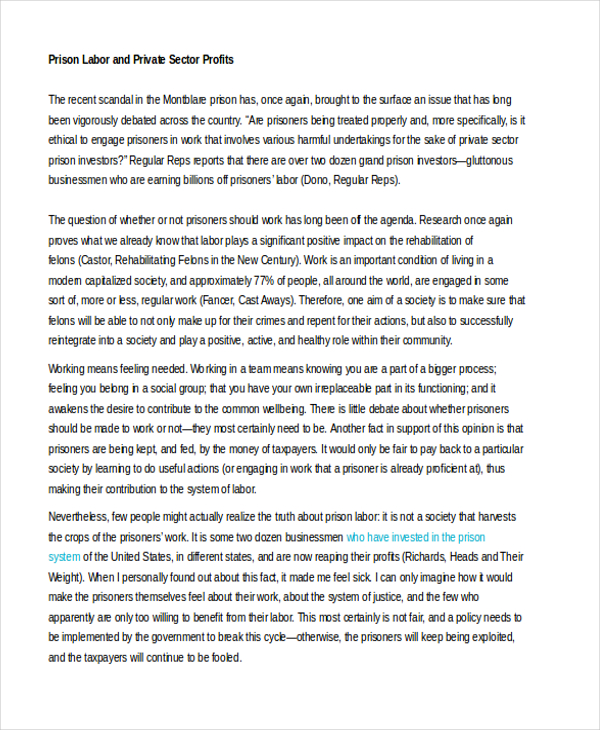
Poetry Analytical Example
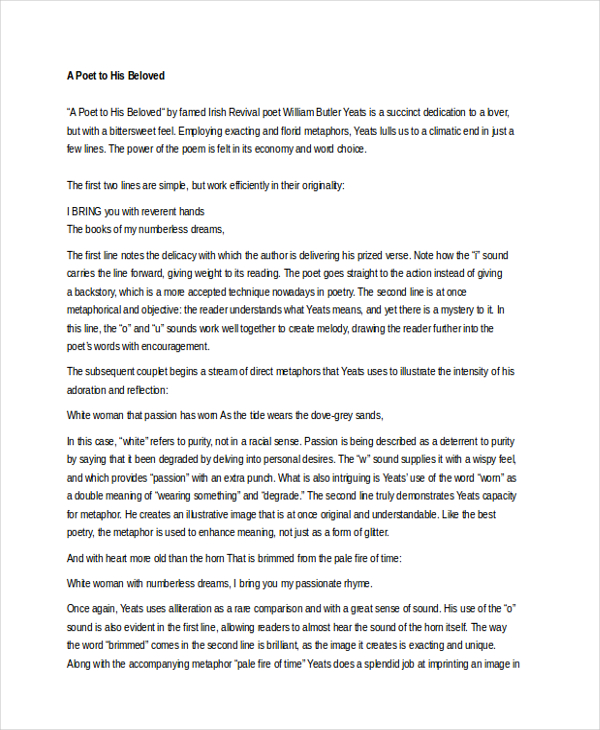
Literary Analytical Essay
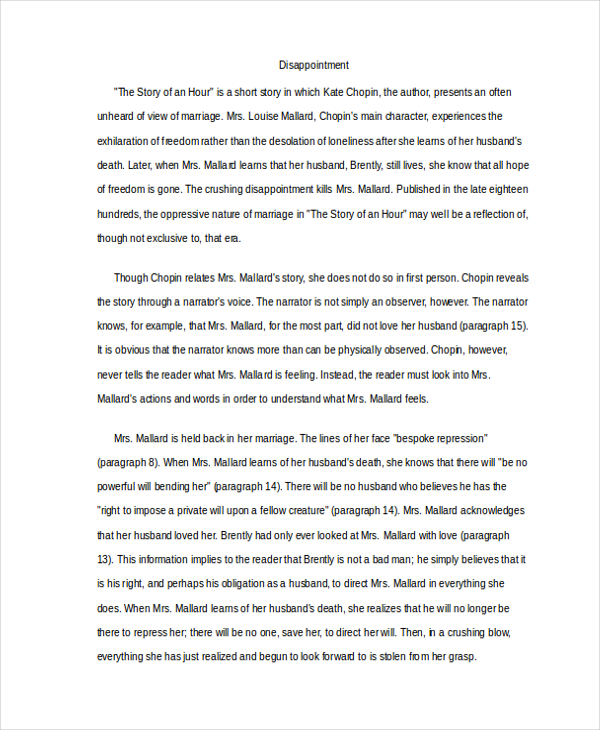

Persuasive Analytical
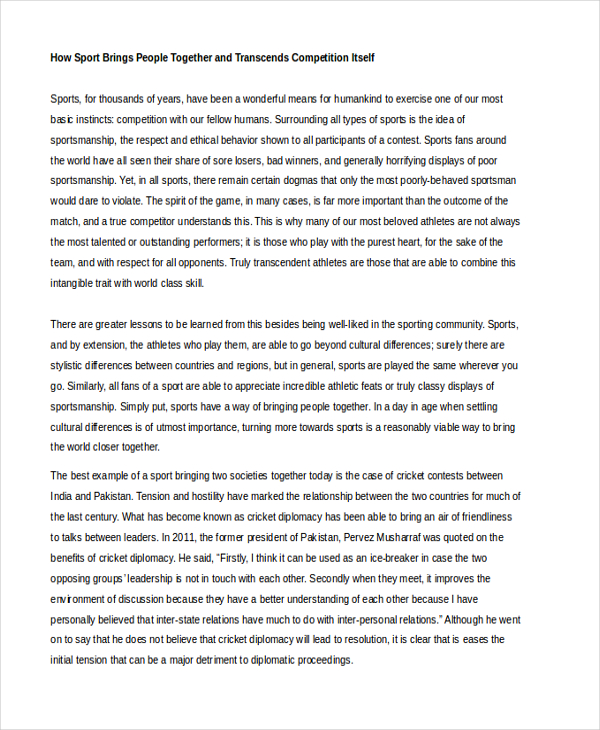
Short Analytical Sample
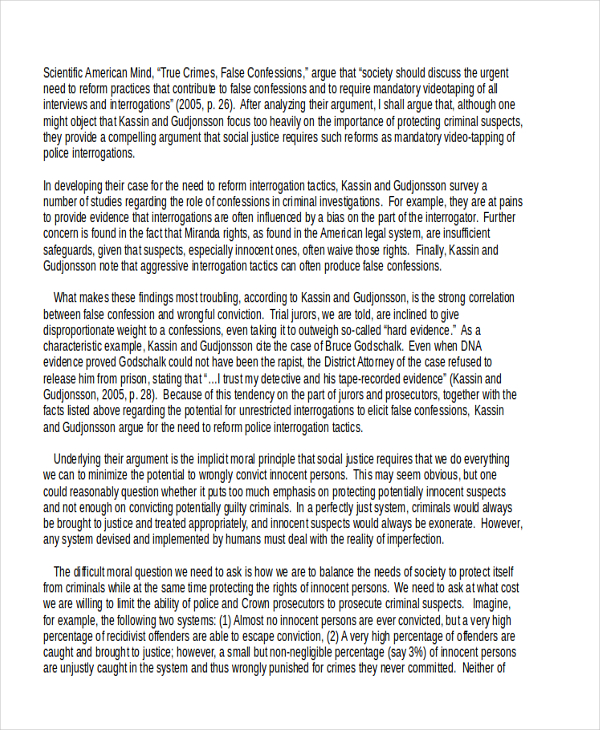
Comparative Analytical Example
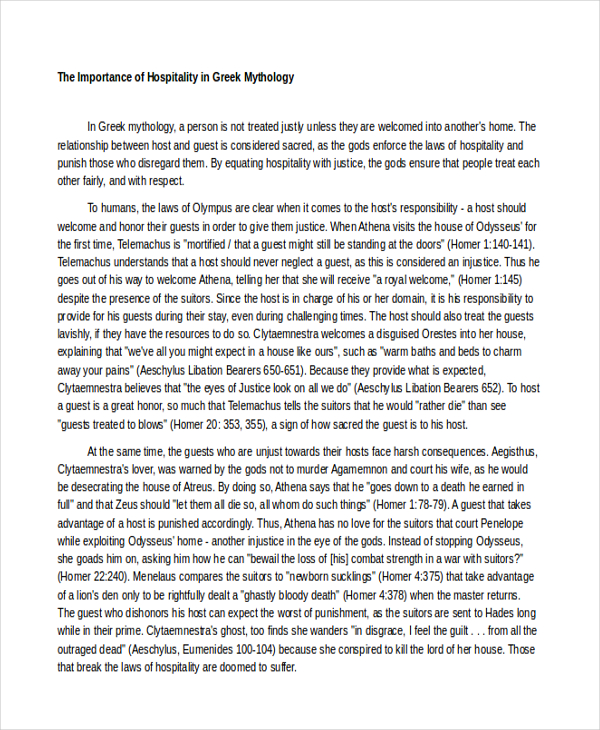
High School Analytical
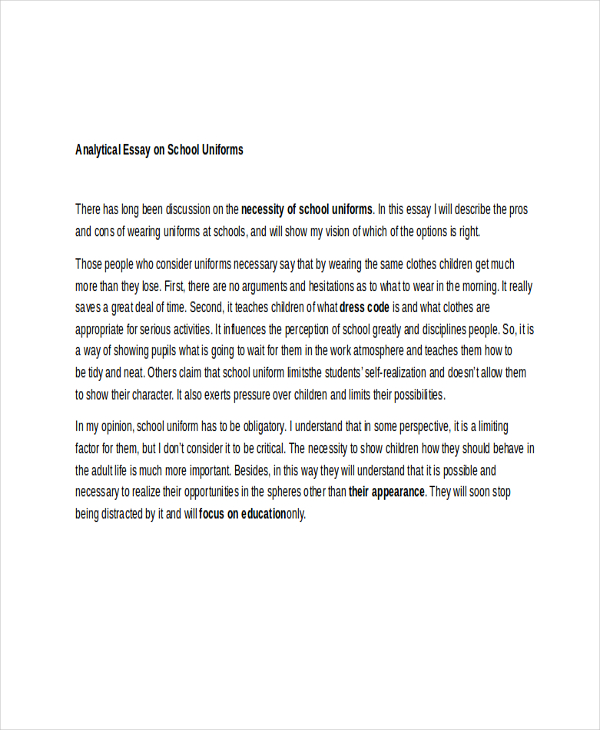
What is the Purpose of an Analytical Essay?
The purpose of an analytical essay is to break down and examine a piece of literature, film, event, or any other subject, in order to present a thorough understanding and insightful interpretation of it. This type of essay focuses on analyzing the subject’s structure, components, and underlying themes or messages. It aims to reveal deeper meanings, relationships, and complexities within the subject, encouraging readers to see beyond the surface level. Additionally, an analytical essay seeks to support its analysis with evidence, thereby fostering critical thinking and enhancing the reader’s comprehension and appreciation of the subject matter. Through this detailed examination, the essay not only contributes to academic discourse but also aids in developing the writer’s analytical and evaluative skills
Analytical Essay vs. Descriptive Essay: What’s the Difference?
The main difference between an analytical essay and a descriptive essay lies in their purpose and approach to the topic. Each serves a unique goal and employs distinct methods to achieve its objectives.
Importance of Analytical Essay
The aim of analytical essay to start is not to present a story but to analyze and it to make readers understand what the writer intends to accomplish with the essay. Some students who are asked to write an analytical essay tend to tell the readers the next scenario of the story instead of analyzing it. Remember that it is not a narrative essay, rather an essay which is aimed at analyzing the subject.
The importance of analytical essay is to provide readers a more comprehensible understanding of a story or a book by assessing all its important elements. It is a good way of practicing critical thinking by looking at a story from different angles.
How to Conclude an Analytical Essay
The conclusion of any essay, like in an expository essay , is to recap the main point in order for the readers to get a gist of the essay. This process of making a conclusion can also be applied to an analytical essay, except the writer should be able to present two important factors: the analysis and the argument .
- The analysis is the study of the main issue that is presented with its supporting elements, like the plot of the story and the characters.
- The argument is your personal response to the subject and line of reasoning based on the analysis.
How Do You Write a Text Analysis Essay?
To write a text analysis essay, start by reading the text critically to understand its themes, characters, and plot. Develop a thesis that makes a claim about the text, then organize your essay into an introduction, several body paragraphs that support your thesis with evidence from the text, and a conclusion that summarizes your analysis and reiterates the thesis.
What is the Pattern of an Analytical Essay?
The pattern of an analytical essay typically includes an introduction with a thesis statement, body paragraphs that present evidence and analysis to support the thesis, and a conclusion that summarizes the analysis and reinforces the thesis. Each body paragraph should focus on a specific aspect of the analysis.
Is an Analytical Essay a Persuasive Essay?
An analytical essay is not inherently a persuasive essay, but it can contain persuasive elements. While an analytical essay focuses on breaking down and interpreting information, a persuasive essay aims to convince the reader of a particular viewpoint. However, both may use evidence and reasoning to support their purposes.
What is the Hardest Type of Essay to Write?
The hardest type of essay to write can vary depending on the writer’s skills and interests, but many find persuasive essays challenging due to the need to effectively argue a point of view, using logic, reasoning, and evidence to convince readers to agree with a specific stance.
What is an Analytical vs Descriptive Essay?
An analytical essay breaks down and interprets various aspects of a topic to provide in-depth understanding or argument, focusing on the “how” and “why.” In contrast, a descriptive essay vividly describes a person, place, object, or event, focusing on creating a sensory experience for the reader.
Is an Analytical Essay an Expository Essay?
Yes, an analytical essay can be considered a type of expository essay. Both aim to explain or inform. However, an analytical essay specifically analyzes and interprets elements of a subject to provide deeper insight, while expository essays can also define, explain, or instruct without necessarily analyzing.
Text prompt
- Instructive
- Professional
Key Steps for Writing an Analytical Essay
Crafting Thesis Statements for Analytical Essays
Analytical Essay Outline: Structure Your Thoughts
Transition Words for Cohesive Analytical Essays
Analyzing Themes: Tips for Analytical Essays
Comparing and Contrasting in Analytical Essays
Using Evidence Effectively in Analytical Essays
Concluding Your Analytical Essay with Impact
Analytical Essay on Historical Events: How-To
Literary Analysis: Dissecting Symbolism in Texts
Analytical vs. Descriptive
What's the difference.
Analytical and descriptive are two different approaches used in various fields of study. Analytical refers to the process of breaking down complex ideas or concepts into smaller components to understand their underlying principles or relationships. It involves critical thinking, logical reasoning, and the use of evidence to support arguments or conclusions. On the other hand, descriptive focuses on providing a detailed account or description of a particular phenomenon or event. It aims to present facts, observations, or characteristics without any interpretation or analysis. While analytical aims to uncover the "why" or "how" behind something, descriptive aims to provide a comprehensive picture of what is being studied. Both approaches have their own merits and are often used in combination to gain a deeper understanding of a subject matter.
Further Detail
Introduction.
When it comes to research and data analysis, two common approaches are analytical and descriptive methods. Both methods have their own unique attributes and serve different purposes in understanding and interpreting data. In this article, we will explore the characteristics of analytical and descriptive approaches, highlighting their strengths and limitations.
Analytical Approach
The analytical approach focuses on breaking down complex problems or datasets into smaller components to gain a deeper understanding of the underlying patterns and relationships. It involves the use of logical reasoning, critical thinking, and statistical techniques to examine data and draw conclusions. The primary goal of the analytical approach is to uncover insights, identify trends, and make predictions based on the available information.
One of the key attributes of the analytical approach is its emphasis on hypothesis testing. Researchers using this method formulate hypotheses based on existing theories or observations and then collect and analyze data to either support or refute these hypotheses. By systematically testing different variables and their relationships, the analytical approach allows researchers to make evidence-based claims and draw reliable conclusions.
Another important attribute of the analytical approach is its reliance on quantitative data. This method often involves the use of statistical tools and techniques to analyze numerical data, such as surveys, experiments, or large datasets. By quantifying variables and measuring their relationships, the analytical approach provides a rigorous and objective framework for data analysis.
Furthermore, the analytical approach is characterized by its focus on generalizability. Researchers using this method aim to draw conclusions that can be applied to a broader population or context. By using representative samples and statistical inference, the analytical approach allows researchers to make inferences about the larger population based on the analyzed data.
However, it is important to note that the analytical approach has its limitations. It may overlook important contextual factors or qualitative aspects of the data that cannot be easily quantified. Additionally, the analytical approach requires a strong understanding of statistical concepts and techniques, making it more suitable for researchers with a background in quantitative analysis.
Descriptive Approach
The descriptive approach, on the other hand, focuses on summarizing and presenting data in a meaningful and informative way. It aims to provide a clear and concise description of the observed phenomena or variables without necessarily seeking to establish causal relationships or make predictions. The primary goal of the descriptive approach is to present data in a manner that is easily understandable and interpretable.
One of the key attributes of the descriptive approach is its emphasis on data visualization. Researchers using this method often employ charts, graphs, and other visual representations to present data in a visually appealing and accessible manner. By using visual aids, the descriptive approach allows for quick and intuitive understanding of the data, making it suitable for a wide range of audiences.
Another important attribute of the descriptive approach is its flexibility in dealing with different types of data. Unlike the analytical approach, which primarily focuses on quantitative data, the descriptive approach can handle both quantitative and qualitative data. This makes it particularly useful in fields where subjective opinions, narratives, or observations play a significant role.
Furthermore, the descriptive approach is characterized by its attention to detail. Researchers using this method often provide comprehensive descriptions of the variables, including their distribution, central tendency, and variability. By presenting detailed summaries, the descriptive approach allows for a thorough understanding of the data, enabling researchers to identify patterns or trends that may not be immediately apparent.
However, it is important to acknowledge that the descriptive approach has its limitations as well. It may lack the rigor and statistical power of the analytical approach, as it does not involve hypothesis testing or inferential statistics. Additionally, the descriptive approach may be more subjective, as the interpretation of the data relies heavily on the researcher's judgment and perspective.
In conclusion, the analytical and descriptive approaches have distinct attributes that make them suitable for different research purposes. The analytical approach emphasizes hypothesis testing, quantitative data analysis, and generalizability, allowing researchers to draw evidence-based conclusions and make predictions. On the other hand, the descriptive approach focuses on data visualization, flexibility in handling different data types, and attention to detail, enabling researchers to present data in a clear and concise manner. Both approaches have their strengths and limitations, and the choice between them depends on the research objectives, available data, and the researcher's expertise. By understanding the attributes of each approach, researchers can make informed decisions and employ the most appropriate method for their specific research needs.
Comparisons may contain inaccurate information about people, places, or facts. Please report any issues.

Academic writing
- Thinking about grammar
- Correct punctuation
- Writing in an academic style
Styles of writing
Descriptive writing, analytical writing, reflective writing.
- Effective proof reading
When you’re asked to write an assignment you might immediately think of an essay, and have an idea of the type of writing style that’s required.
This is likely to be a ‘discursive’ style, as often in an essay you’re asked to discuss various theories, ideas and concepts in relation to a given question. For those coming to study maths and science subjects, you might be mistaken in thinking that any guidance on writing styles is not relevant to you.
In reality, you’ll probably be asked to complete a range of different assignments, including reports, problem questions, blog posts, case studies and reflective accounts. So for the mathematicians and scientists amongst you, you’re likely to find that you’ll be expected to write more at university than perhaps you’re used to. You may be asked to write essays, literature reviews or short discussions, in which all the advice on this course, including the advice below, is of relevance. In addition, even writing up your equations or findings will require you to carefully consider your structure and style. Different types of assignment often call for different styles of writing, but within one assignment you might use a variety of writing styles depending on the purpose of that particular section.
Three main writing styles you may come across during your studies are: descriptive , analytical and reflective . These will require you to develop your writing style and perhaps think more deeply about what you’ve read or experienced, in order to make more meaningful conclusions.
The diagram below shows examples of each of these writing styles. It takes as an example a trainee teacher’s experience within a classroom and shows how the writing style develops as they think more deeply about the evidence they are presented with.

All of these forms of writing are needed to write critically . You’ll come across the term critical in lots of contexts during your studies, for example critical thinking, critical writing and critical analysis. Critical writing requires you to:
• view a topic from a variety of angles
• evaluate evidence
• present a clear conclusion
• and reflect on the limitations of your own argument.
So how will you know which writing style is needed in your assignments? As mentioned, most academic assignments will require a certain amount of description but your writing should mainly be analytical and critical. You’ll be given an assignment brief and marking guidelines, which will make clear the expectations with regards to writing style. Make sure you read these carefully before you begin your assignment.
It’s unlikely that you’ll be asked to only write descriptively , though this form of writing is useful in certain sections of reports and essays. You’ll need elements of description in essays before you go on to analyse and evaluate. The description is there to help the reader understand the key principles and for you to set the scene. But description, in this case, needs to be kept to a minimum.
However descriptive writing is often used in the methodology and findings sections of a report, or when completing a laboratory report on an experiment. Here you’re describing (for instance) the methods you adopted so that someone else can replicate them should they need to. Descriptive writing focuses on answering the ‘what?’ ‘when’ and ‘who’ type questions.
Analytical writing style is often called for at university level. It involves reviewing what you’ve read in light of other evidence. Analytical writing shows the thought processes you went through to arrive at a given conclusion and discusses the implications of this. Analytical writing usually follows a brief description and focuses on answering questions like: ‘why?’ ‘how?’ and ‘so what?’
Have a look at our LibGuide on Critical Analysis: Thinking, Reading, and Writing for more in-depth guidance on analytical writing.
Not all writing will require you to write reflectively . However you might be asked to write a reflective account after a work placement or find that at the end of a report it might be appropriate to add some personal observations. This style of writing builds on analysis by considering the learning you’ve gained from practical experience. The purpose of the reflection is to help you to make improvements for the future and, as such, it is a more ‘personal’ form of academic writing often using the first person. Evidence still has a key role in reflective writing; it’s not just about retelling your story and how you felt. And evidence in the case of reflection will include your own personal experience which adds to the discussion. Reflective writing focuses on future improvements and answers questions like ‘what next?’
- Practice-based and reflective learning LibGuide More details on thinking and writing reflectively.
- << Previous: Writing in an academic style
- Next: Effective proof reading >>
- Last Updated: Jun 21, 2024 10:30 AM
- URL: https://libguides.reading.ac.uk/writing

Guilherme Mazui
- What is the Difference Between Analytical and Descriptive?
The main difference between analytical and descriptive research lies in their purpose and approach. Here are the key differences between the two:
- Descriptive research aims to describe a situation, problem, or phenomenon accurately, providing a snapshot of specific phenomena at a particular point in time.
- Analytical research goes beyond description to analyze and interpret data, unearth insights, understand underlying relationships, or solve problems.
- Descriptive research collects data to portray or snapshot the subject matter accurately, classifying, describing, comparing, and measuring data.
- Analytical research uses data to conduct deeper analysis, identify patterns, and explore cause-effect relationships, focusing on cause and effect.
- Descriptive research provides a clear and detailed picture of the situation or issue.
- Analytical research offers insights, explanations, or solutions based on a thorough analysis.
- Complexity :
- Descriptive research is generally more straightforward, as it only describes the existing state of affairs.
- Analytical research is more complex, involving critically examining data to draw meaningful conclusions.
In summary, descriptive research focuses on accurately portraying the current state of variables or conditions, while analytical research delves deeper to understand, interpret, or explain why and how certain phenomena occur, aiming to uncover underlying relationships and causality between variables.
Comparative Table: Analytical vs Descriptive
The main difference between analytical and descriptive writing lies in their focus and purpose. Here is a table comparing the two:
Descriptive writing focuses on providing clear descriptions of facts or things that have happened, while analytical writing evaluates information and draws conclusions based on the data and context. In most cases, both types of writing are used in combination to effectively communicate ideas and findings.
- Descriptive vs Analytic Epidemiology
- Prescriptive vs Descriptive
- Descriptive vs Correlational Research
- Descriptive vs Exploratory Research
- Narrative vs Descriptive Essay
- Descriptive vs Inferential Statistics
- Descriptive vs Experimental Research
- Case Study vs Descriptive Approach to Research
- Summary vs Analysis
- Description vs Definition
- Qualitative Analysis vs Quantitative Analysis
- Explain vs Describe
- Job Analysis vs Job Description
- Analysis vs Synthesis
- Narration vs Description
- Analysis vs Analyses
- Quantitative vs Qualitative
- Prescriptivism vs Descriptivism
- Predictive vs Prescriptive Analytics

Analytical vs. Descriptive: Understanding the Differences
Analytical and descriptive writing styles are distinct methodologies used in academic and research writing. While both styles serve a purpose, they are unique in their approach and presentation of information.
Key Takeaways
- Descriptive writing aims to provide readers with facts and information, answering questions such as what, when, and where.
- Analytical writing focuses on evaluation, comparison, and examination of facts, answering questions such as why, what, and what next.
- Descriptive writing is often characterized by rich language and metaphors, while analytical writing features structured content and logical conclusions.
Descriptive Writing
Descriptive writing is considered a simpler form of academic writing, as it primarily focuses on presenting facts and information to readers. This style of writing answers questions like what, when, where, and who. Examples of descriptive writing include summaries of articles or scientific experiment results. Instructors may use words such as summarize, collect, define, list, report, or identify to indicate that they want descriptive writing.
Descriptive writing can be used to describe individuals, places, or things, and aims to provide readers with a vivid image or feeling. This often involves using rich language and heavily loaded words full of metaphors. Although some pieces are purely descriptive, this style of writing is often used as an introduction or prelude to other styles.
Analytical Writing
Analytical writing focuses on evaluation, comparison, and analysis, going beyond merely describing an event, person, or thing. This style of writing answers questions like why, what, and what next. It requires the writer to present information in an argumentative manner, using reasoning and evidence to support their claims.
In analytical writing, the primary goal is not to provide facts or information, but to examine, compare, and evaluate them to make a judgment. This writing style often establishes cause and effect relationships. The content in analytical writing is more structured and logically organized, leading to a conclusion.
Analytical vs Descriptive
While descriptive and analytical writing styles may seem exclusive and completely different from one another, it is often necessary to use both in a single piece. Descriptive writing is best for answering questions such as what, when, and where, while analytical writing is better suited for answering why, what, and what next.
The purpose of descriptive writing is to present facts and information, whereas the purpose of analytical writing is to analyze, compare, and evaluate something. Descriptive writing is characterized by richer language, while analytical writing features more structured content and logical conclusions.
LEAVE A REPLY Cancel reply
Save my name, email, and website in this browser for the next time I comment.
Related Articles
Difference between power & authority, distinguishing could of & could have, distinguishing pixie & bob haircuts, distinguishing between debate & discussion, distinguishing between dialogue & conversation, distinguishing between a present & a gift, distinguishing between will & can, distinguishing between up & upon.

IMAGES
COMMENTS
Descriptive writing focuses on the what, while critical/analytical writing focuses on the so what. Analytical writing should link the discussion back to the research aims, objectives or research questions (the golden thread).
A descriptive essay gives non-biased details, while an analytical essay identifies if a response has a positive or negative impact. An analytical essay’s primary objective is to assess, examine, and identify something, while a descriptive essay’s overall purpose is to reveal information and details.
Purposes of Descriptive Writing: To provide context or background information. Informative: to provide factual detail. Expository: to explain something. Examples: newspapers, reviews, summaries, synopses, popular journalism. Analytical Writing: Evaluative and critical. Seeks to go beyond the description of facts or details
Sep 5, 2024 · Analytical Essay vs. Descriptive Essay: What’s the Difference? The main difference between an analytical essay and a descriptive essay lies in their purpose and approach to the topic. Each serves a unique goal and employs distinct methods to achieve its objectives.
Analytical writing is evaluative and critical. It seeks to go beyond the descriptive presentation of facts or details to the reader, and instead evaluates and investigates their significance. In other words, analytical writing demonstrates the ‘why’, ‘how’, and ‘so what’, interpreting the significance and meaning of the ‘who’, ‘what’, and ‘where’.
While analytical aims to uncover the "why" or "how" behind something, descriptive aims to provide a comprehensive picture of what is being studied. Both approaches have their own merits and are often used in combination to gain a deeper understanding of a subject matter.
Jun 21, 2024 · Descriptive writing focuses on answering the ‘what?’ ‘when’ and ‘who’ type questions. Analytical writing style is often called for at university level. It involves reviewing what you’ve read in light of other evidence.
In summary, descriptive research focuses on accurately portraying the current state of variables or conditions, while analytical research delves deeper to understand, interpret, or explain why and how certain phenomena occur, aiming to uncover underlying relationships and causality between variables.
Jun 19, 2023 · Analytical writing focuses on evaluation, comparison, and examination of facts, answering questions such as why, what, and what next. Descriptive writing is often characterized by rich language and metaphors, while analytical writing features structured content and logical conclusions.
Use the following questions to help you think and then write in the appropriate style, or move your writing from one style to another. For example, if your writing is mainly descriptive yet you have been asked to evaluate, consider questions such as “Why is this significant?” and “What does this mean?” Note.